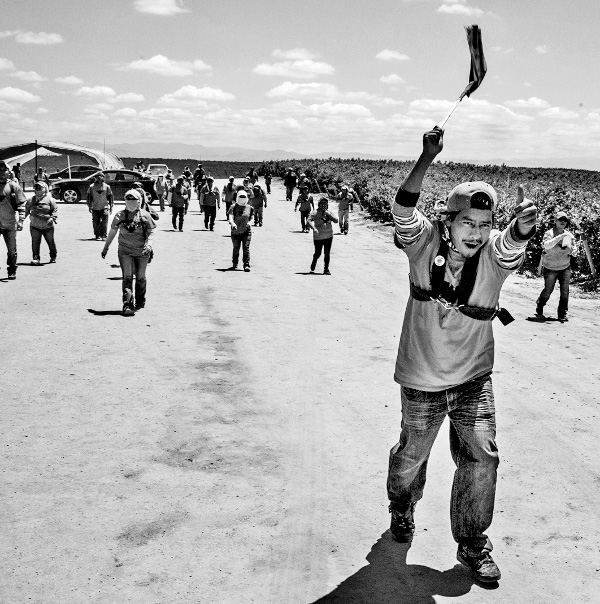
PHOTO/DAVID BACON
On the edge of a San Joaquin Valley blueberry field, hundreds of workers lined up in the pre-dawn darkness in May, ready to vote in a union election. Most wore red t-shirts emblazoned with the black eagle of the United Farm Workers.
As the sun came up, their lines moved slowly toward the ballot boxes. By eleven o’clock it was over, and they watched an agent of the California Agricultural Labor Relations Board count the ballots—347 to 68 in favor of the union. The cheering started.
Most were from Oaxaca—Mixtecos and Zapotecos. Like many of the 165,000 indigenous Mexican migrants in California fields, many don’t speak Spanish well. “The foreman humiliates them,” one worker said. “He makes fun of them and says they work like turtles.”
Conflict about the piece rate paid by Klein Management, the farm’s owner, led to a workers’ rebellion. In April, the company was paying pickers 95¢ per pound. By mid-May, the price had dropped to 70¢, then 65¢. Finally the company announced it was dropping it again—to 60¢. Workers refused to go in to pick. The strike was on.
While the piece rate cut was the most immediate cause of the strike, workers had other complaints as well. To earn an average paycheck of $700, workers pick seven days a week. And despite a recent court decision that even piece rate workers must be given paid breaks, the first paid break in the Klein fields came on the day of the election.
The strike and union campaign at Klein Management are part of a larger movement among Mexican indigenous farm workers sweeping through the whole Pacific coast. Work stoppages by Triqui and Mixteco blueberry pickers have hit Sakuma Farms in Burlington, Washington for the past three years. Workers there launched a boycott of Driscoll’s, the world’s largest berry distributor.
In the San Quentin Valley of Baja California, thousands of blueberry and strawberry pickers walked out for three weeks a year ago. They joined the boycott of Driscoll’s, which also distributes berries from the area’s largest grower, BerryMex.
According to a recent survey, a third of indigenous workers earned above the minimum wage, a third reported earning exactly the minimum, and a third reported earning below the minimum—an illegal wage.
The lopsided union majority in the election may convince the company to negotiate. But Buck Klein, owner of Klein Management, told the Californian’s reporter, Lois Henry, “The market is the market. That’s what dictates our prices. Even if there’s a union contract and we negotiate a price with them, it’s the same thing. The market is the market.”
Jessica Ruiz responds: “We work in the sun all day, and we work hard. I have no problem with the work, though. My problem is with the things they do to us. I’ve been waiting for this for a long time. I’m very proud of my people and what we’ve done. One of the owners said they’d send me to jail when I took the people out. But they’re not going to stop us.”
A version of this story appeared in In These Times.
David Bacon is author of Illegal People—How Globalization Creates Migration and Criminalizes Immigrants (2008) and The Right to Stay Home (2013), both from Beacon Press. His latest book, about the US-Mexico border, More Than a Wall / Mas que un muro, is coming in May 2022 from the Colegio de la Frontera Norte.
